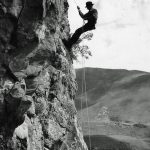Beyond the Algorithm: The Olympics Theory

Courtesy photo
Every four years, the world gathers to watch as the best of every nation competes at the Olympic Games, broadcast all around the world. The excitement for each competition builds. But before an athlete ever steps into the arena, onto the field, the slopes, or on the mat, there’s a moment that makes us sit up and pay attention — that 90-second montage that shows their Olympic journey. We see early mornings in quiet kitchens, the long drives in the dark to train, and their sacrifice. We catch a glimpse of what it took to get there.
When the competition begins, we’re invested. We don’t just want them to win — we need them to. Because now, we care about their story. Their victory or disappointment feels like our own.
That’s what I call The Olympics Theory — the idea that context creates connection. The story before the spotlight is what turns a spectator into a supporter. Without it, even the most extraordinary achievement can feel distant. With it, every small victory becomes personal.
In Aspen, I’ve had countless conversations with people who have built, reinvented, and rebuilt their lives — in business, in art, in the mountains. And the more stories I hear, the clearer it becomes: success is rarely cinematic in real time. It’s often quiet, repetitive, and full of moments that matter but that never make the highlight reel.
The most accomplished people I’ve met share one thing — a willingness to keep showing up even when no one’s watching. They talk about self-doubt, fatigue, and the long stretches of uncertainty that have shaped their resilience. They describe learning to pace themselves, to trust timing, to surrender control. Those unseen stretches, the years of preparation before the moment of recognition, of success, are where the real work lives.
And that’s also where the heart of good storytelling lies. Not in the polish, but in the process. Not in perfection, but in perseverance.
As marketers, we often focus on getting our work past the finish line — planning the campaign, crafting the perfect headline, executing the product launch. But audiences don’t connect to outcomes; they connect to odysseys. They want to know what it cost to get there. They want to also see the human fingerprints on the brand, the missteps that made the message honest.
That’s why, to me, every great marketing story mirrors an Olympic journey: it earns its audience through truth. It reminds people that behind every company or creative pursuit is a person who doubted, adapted, and kept going even when things seemed impossible.
If the last few years of conversations in Aspen have taught me anything, it’s that no one is immune to uncertainty. Yet the people who thrive here — in business, design, or the arts — share a quiet confidence that struggle isn’t the opposite of success. It’s a vital part of the process and one that makes success all the sweeter.
The Olympics Theory is a reminder that the world doesn’t fall in love with talent alone. It falls in love with the story that came before. With the training, the cost, and the courage to try again.
So before your next campaign, your next pitch, or your next leap, take a moment to think about the journey that led you here. That’s the montage your audience needs to see, too.
Because in marketing, just like in sport, the gold isn’t won in the moment of triumph alone. It’s also earned in every moment that comes before it — the ones that prove you’re only human.
Bryan Welker lives and breathes business and marketing in the Roaring Fork Valley and beyond. He is President, Co-founder, and CRO of WDR Aspen, a boutique marketing agency that develops tailored marketing solutions. Have any marketing questions? Reach out to bryan@wdraspen.com.
Beyond the Algorithm: The Olympics Theory
Before an athlete ever steps into the arena, onto the field, the slopes, or on the mat, there’s a moment that makes us sit up and pay attention — that 90-second montage that shows their Olympic journey.









